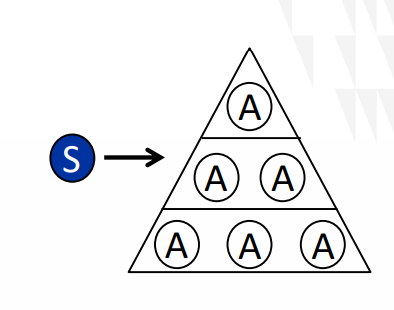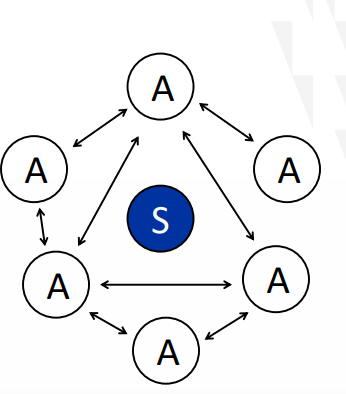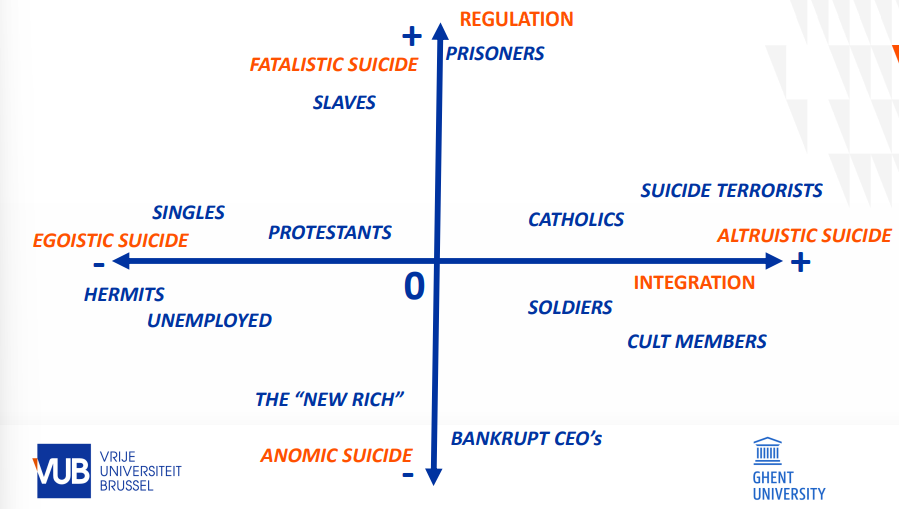episode 1: towards a sociological definition of "critique"
1. what is critique?
the “why” question
ALL sciences are ultimately about finding answer to (particular) why-questions
implies that
there is a reason why things are the way they are (things not random) → God vs science
this reason can be discovered using method of positive, empirical science (observation, experiment, survey, analysis, etc.)
social sciences: part of reason of why things are the way they are should be located in the aprticular organization of human groups (social structure)
it’s only “natural”
in modern Western societies appeals to God or religious forces are increasingly rare, more common to appeal to nature or biology
de-naturalization
wore task of the social sciences = de-naturalization
to show that what presents itself as “natural” in fact has clear social (man-made) causes
natural in the double sense
self-evident, normal, manner-of-fact
biological, genetic, innate
how?
history: uncover genealogy of our everyday practices, show what they looked like in the past (contrast in TIME)
anthropology: compare “ou” everyday practices with those of other societies on the globe (contrast in SPACE)
denaturalization in history
historicization is an important tool of denaturalization
by uncovering (often repressed) history of certain practices and beliefs it becomes possible to show their socially constructed character
anthropologists don’t rely on historicization, but use culturization
denaturalization in anthropology
culturization tool of denaturalization
by uncovering (often repressed) culture of certain practices and beliefs it becomes possible to show their socially constructed character
getting “outside”
both history and anthropology can claim a position “outside” of their objects, both benefit from distance
distance makes “exotic”
sociology studies things in the here and now (= historiancs of the present/anthropologists of the familiar)
OK when science studies the practices and opinions of the “others”, less OKw hen it studies our own
how?
sociology: denaturalization through de-individualization
compare different groups (income, level of education, gender, ethnicity, status, etc.) within one and the same society
show that the unique, the subjective, the personal very often has general, objective and impersonal causes
later this semester: the importance for social class
a bitter pil…
runs counter to the dominant social philosophy of our society = individualism
sociology provokes considerable resistance… especially (but not exclusively) among privileged social groups
difference social and life science
single hermeneutic
life science
view in 1 way
relationship of knowing 1 way: science → object of study
double hermeneutic
social science
scientist → object of study
BUT people are also trying to make sense of reality between each other
AND people change science too
AND conepts social science are also ine veryday life
AND they try to make sense of science
social science and sociology is the interpretation of interpreting beings
Schütz: sociological theories are theories of the second-degree
Garfinkel: sociology is an account of accounts
sociologists are NOT the only ones producing theories about the social worrld
they compete with both lay and professional (journalists, politicians, writers, commentators, celebrities etc.) producers of social theory
sociology shapes society, society shapes sociology
a sociological syllogism
Premise 1: the way that human beings perceive and judge the world is shaped by their (position in) society
Premise 2: sociologists are human beings
Hence: the way that sociologists perceive and judge the world is shaped by their (positon in) society
BUT: how is objective knoledge possible? how can we produce knowledge claims that are universally valid?
(un)learning
in the natural sciences: learning is discovering qualitatively “new” aspects of reality
as sociologists: learning is often un-learning, ridding yourself of habitual ways of looking at things
difficulty = gaining a novel perspective on the thoroughly familiar
especially in the face of existing theories and concepts about the social world produced by (more powerful) others
“common sense”
people have clear opinions and form their own theories about race, gender, the economy, education, inequality, poverty etc.
prepositions in everyday life (= Durkheim’s prenotions, faulty way of making sense of life
importance of concepts and definitions
tangled and obscured connotations to social concepts
social science doesn’t have monopoly on theory and knowledge of the social world
does this matter? depends on your theoretical perspective
critique in western social thought
2 ways of dealing with common sense
critique in Kantian sense
human consciousness !!
consciousness not passive reception, but actively shapes the world around
our consciousness not shaped by world of objects, our consciousness shapes the world of objects
for Kant: categories of consciousness are a priori = innate, universal
Hance: analysis must turn inwards, aim to clarify how the actor experiences her world
interrogation into basic categories of human mind
mind makes structure of the world
mind was born with the ability to structure the world
critique in Marxian sense
economic/material reproduction determines human relations, culture, beliefs, cosciousness
our social being (sein) precedes our consciousness (bewusstsein)
study the historical developments int eh way that humans have organized thair economic/material reproduction to understand human subjectivity
hence: analysis must turn outwards, examine the material conditions that shape how social actors think, feel and perceive the world
the objective world (economic conditions) shapes consciousness
subjectivism/constructivism vs objectivism/structuralism
these 2 different conception of critique are at the base of a central division in social theory
subjectivism and objectivism are at the basis of two quite distinct social epistemologies and two different social ontologies
both have different conception of the task of professional sociologists. Both have different views of sociology as a tool of social critique
subjectivist/constructivist
Kant → Husserl → Schütz → Garfinkel, Berger &Luckmann, Blumer, Latour
relationship between social analyst and social actors = symmetrical
sociology should not explain WHY people do what they do, it describes HOW they do it
sociologists should study how actors actively create a common sense-world and the spontaneous sociologies they produce in the process
actors are competent agents, little, qualitative difference between lay and professional social theory
get in between the people

objectivist/structuralist
Marx & Engels → Gramsci → Bourdieu →…
relationship between social analyst and social actors = asymmatrical
sociology should break with spontaneous sociology of actors
social theory is qualitatively better, than lay theory, which is often partial, biased, false
sociology should explain WHY people do what they do, reveal the reasons behind their actions and thoughts
sociology has a strong emancipatory function, should be a tool of social critique

let’s rewind
contra to other social sciences, sociology can’t claim position outside of its research object
sociology is part and parcel of its object of study (we’re shaped by society and we in turn shape society)
social world is populated with conepts and theories that lay actors have developed to interpret and judge this world (double hermeneutic)
“common sense”
the host of theories and concepts that social actors spontaneously develop to nevigate the social world
how to deal with “common sense”
Kantian critique → subjectivist sociology

Marxian critique → objectivist sociology

objectivist sociology sees common sense as obstacle to the development of scientific knowledge of the socila
people’s beliefs, opinions, attitudes can’t be used as an instrument of explanation, they get int he way of a decent scientific explanation
people’s thoughts and actions are determined by factors that elude their consciousness, factors that relate to social structure
sociology = systematic attempt to uncover this structure
2. Emile Durkheim and sociology against prenotions
Emile Durkheim
founding father (French) sociology
established sociology as academic discipline and as empirical science
science of societies should not consist of mere paraphrase of traditional prejudices, but should cause us to see things in different way from the ordinary man, for purpose of any science is to make discoveries and all such discoveries more or less upset accepted opinions
idola fori
Francis Bacon, coined the terms prenotions, Durkheim used it
prenotions: idols of the market place = everyday gossip and terms for stuff
prénotions
sociology’s objects of study often can’t be empirically observes in their totality
religions, nations, states, classes, societies, etc. onyl directly reveal themselves by their constitutive elements (artefacts, symbols, institutions, buildings etc.)
this makes it all the more dangerous to confuse the terms we have for these entities with their actual reality
Durkheim warns against risk of ideological analysis, the study of concepts, rather than things
partial, schematic, incorrect epresenatations of the social world embedded in everyday words and expressions
developed for practical action and judgment, not scientific understanding

the “categories” of everyday life
everyday terms that are developed to denounce, criticize,attack…
category = Greek for charge, accusation or for to accuse publicly, to denounce
prenotions can isolate, hemogenize, blow up problems or draw boundaries where there are none
methodological problem: pure experimentation not possible
we can compare, BUT where you cut reality is important

a negative rule
mistrust any definition or classification you haven’t made yourself
beware of the pre-defined objects that common sense provides you with
a positive rule
ignoring existing terminology and classifications is an entirely negative rule
what shoudl we do to avo!id reproducing common sense?
adequate defintions? sure, BUT: still run the risk of mistaking the name for the thing itself
the most decisive step is to decide what counts as data for our research
social facts as things
first and most basic rule
subject matter of research must only include a group of phenomena defined beforehand by certain common external characteristics and all phenomena which correspond to this defenition must be so included
define phenomena independent of the subjective perception/opinions that both social actors and social analysts have of them
how to determine social facts
how to determine for example what counts as criminal behaviour?
Durkheim: NOT by
asking what poeple judge to be immoral, unethical or deviant
using our own (Western) definitons of ciminality
BUT: look at external, objective act that all types of criminal behaviour inevitably produce → punishment
being objective in our definition of data seems important, but why is Durkheim so paranoid about subjective attitudes, perceptions, beliefs?
sociology vs anti-psychology
Durkheim is critical of common sense for epistemological reasons: it stands in the way of objective social science
BUT: also a more provincial reason why Durkheim discredits subjective attitude and perceptions = the dud was mad at the success of psychology
success of sociology depends on demarcating it from psychology
suicide
study suicide without refering to individuals’ psychological or subjective state
not just genetics or individual personality that determine the odds of killing oneself
suicide not just indicator of individual wellbeing, it’s and index of the wellbeing of society
comparison affords explanation: he compared different cases of suicude
suicide: applied to all cases of death resulting directly or indirectly from a positive or negative act of the victim himself, which he knows will produce this result
positive act: doing something you know will kill you
negative act: not doing something so you die
psychological causes
depression?
but what about: suicide bombers, soldiers who sacrifice themselves for their comrades, lottery-winners?
also, what causes depression?
suicide is a too intimate thing to be more than approximately interpreted by another, it even escapes self-observation
suicide and statistics
solution: compare suicide rates of groups defined on the basis of external, objective characteristics like gender, religious identity, marital status
suicide is innovative forn its use of statistical comparison as a tool of sociological analysis
conclusions: suicide more among men, single people, childless couples, protestants, economic crisis and boom
conclusions: suicide rates determined by variations in degree of social integration and social regulation
social integration: degree to which people are part of a society
social regulation: degree to which a person’s actions and desires are controlled by the society

sociological causality
sociological factors → (psychological factors) → suicide rates
↳social integration and regulation
question is not: should sociology not take into account genetic or psychological factors in its explanations of suicide?
rather: purely psychological or biological explanations of suicide fall short, since they fail to take into account the role of social principles of variation in suicide rates
the causes of this purely individual act transcend the individual, to include patterns of social organisation